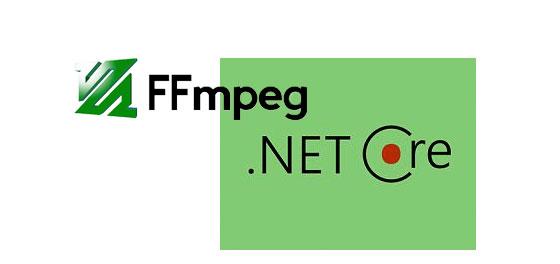
準備工作:
1:Net Core 2.1 為何要用2.1,因為在macOS 10.13上一個奇怪的問題,請看另一篇博文
介紹2:FFmpeg 版本無所謂,最新即可,安裝教程網上很多,當然也可以使用docker進行ffmpeg的部署,下載下傳位址 http://ffmpeg.org/download.html
3:Rider 2018.1.2 在多平台上,比微軟爸爸的VS好用,在window上肯定不如VS,當然你喜歡VSCODE也可以,畢竟JET的全家桶更好吃,哈哈。
目前準備工作就這樣,後續需要添加的時候再一一告知。
好了,開始碼磚。
建立一個簡單的Net core web api應用程式
當你使用dotnet new或者使用IDE建立完成一個web項目後,該項目就已經可以運作,不過隻是一個空殼子,我們需要一些存儲全局變量和控制程式啟動的方式。在Program.cs中的Main函數修改如下
1 public static void Main(string[] args)
2 {
3 var config = new ConfigurationBuilder()
4 .AddCommandLine(args)
5 .Build();
6
7 General.ConfigurationBuilder = config;
8 General.LocalHostUrl = config["ASPNETCORE_URLS"];
9 General.isOpenMiddleware = bool.Parse(config["OPEN_MIDDLEWARE"]);
10
11 var host = new WebHostBuilder()
12 .UseEnvironment(config["ASPNETCORE_ENVIRONMENT"])
13 .UseUrls(config["ASPNETCORE_URLS"])
14 .UseConfiguration(config)
15 .UseKestrel()
16 .UseContentRoot(AppDomain.CurrentDomain.BaseDirectory)
17 .UseIISIntegration()
18 .UseStartup<Startup>()
19 .Build();
20
21 host.Run();
22 } 相信不用解釋太多,各位也明白上面每條語句的作用。筆者使用General靜态類存儲了來之外部指令的啟動參數,這種方式可以避免使用launcthSettings.json進行檔案配置,通過啟動參數直接給定運作方式和環境配置。在使用的過程中可以通過例如:--ASPNETCORE_ENVIRONMENT=Development --ASPNETCORE_URLS=http://localhost:5023 --OPEN_MIDDLEWARE=true進行啟動,前兩個參數不解釋,第三個參數是為了友善多台伺服器部署時候,是否啟動相關的自定義中間件(相關中間件後續章節介紹)。既然本節介紹FFmpeg的使用,那麼接下來我們讨論FFmpeg的使用方式。
ffmpeg是什麼
從度娘(當然你要用谷歌也行)上面抄個介紹:FFmpeg是一套可以用來記錄、轉換數字音頻、視訊,并能将其轉化為流的開源計算機程式。采用LGPL或GPL許可證。它提供了錄制、轉換以及流化音視訊的完整解決方案。它包含了非常先進的音頻/視訊編解碼庫libavcodec,為了保證高可移植性和編解碼品質,libavcodec裡很多code都是從頭開發的。
簡單的說:就是可以處理音視訊媒體的開源程式。
安裝方式這裡不做闡述,安裝完成後輸入ffmpeg會得到如下資訊。
請忽略截圖中的問号和亂碼,不想去折騰zsh。
在http://ffmpeg.org/官網上有詳細指令的使用和介紹,這裡介紹個簡單的指令
ffmpeg -i input.mp4 output.avi 該指令輸入一個input.mp4 檔案,輸出一個output.avi檔案,ffmpeg自動将mp4轉碼為avi檔案并輸出到目前硬碟目錄,就這麼簡單!
通過Process類進行簡單的程序通訊
當然,我們不可能通過純手動的指令行的方式去得到自己想要的檔案,這種方式對于伺服器而言也不可取,不過,Net為我們提供了Process進行與程序間通訊的簡單通路,其實最多也就是指令行的調用,編寫一個通用的處理方法,友善不同地方的調用。
1 public void DoProcessing(string param, ProcessType processType = ProcessType.Ffmpeg)
2 {
3 try
4 {
5 _process.StartInfo.FileName = GetEnvironmentalFfmpeg(GetProcessName(processType));
6 _process.StartInfo.Arguments = param;
7 _process.StartInfo.CreateNoWindow = true;
8 _process.StartInfo.UseShellExecute = false;
9 _process.StartInfo.RedirectStandardOutput = true;
10 _process.StartInfo.RedirectStandardInput = true;
11 _process.StartInfo.RedirectStandardError = true;
12
13 _process.ErrorDataReceived += (sender, args) =>
14 {
15 if (sender is Process p && p.HasExited && p.ExitCode == 1)
16 {
17 Console.WriteLine("have an error:" + args.Data);
18 }
19 };
20
21 if (processType == ProcessType.Ffprobe)
22 {
23 _process.ErrorDataReceived += (sender, args) =>
24 {
25 if (args.Data == "") return;
26 FfprobeDataReceivedEventHandlerArgs?.Invoke(sender, args);
27 };
28 }
29
30 _process.Start();
31 _process.BeginErrorReadLine();
32 _process.WaitForExit();
33 }
34 catch (Exception ex)
35 {
36 Console.WriteLine(ex);
37 }
38 finally
39 {
40 _process.Close();
41 _process.Dispose();
42 }
43 } 以上實作方式都非常簡單,這裡筆者增加了一個委托FfprobeDataReceivedEventHandlerArgs函數,友善觸發輸出事件ErrorDataReceived在其他類中友善被調用,而Ffprobe能擷取到音視訊媒體的詳細資訊,後面代碼中會介紹。
GetEnvironmentalFfmpeg是筆者為了偷懶,在windows中并沒直接安裝ffmpeg程式,而是将exe程式直接綁在了項目dll中,友善該項目在其他win平台的二次調用,而免去再次安裝的繁瑣問題(linux和mac沒法偷懶,除非用docker直接拷貝鏡像檔案)
GetProcessName函數就是一個主指令的選擇方式,ffmpeg中包含三個主要指令,ffmpeg用于處理音視訊,ffplay用于播放,ffprobe用于擷取資訊,常用的主指令也就ffmpeg和ffprobe。
簡單的參數工廠
當然,我們通過一個簡單的主函數去調用ffmpeg指令是遠遠不夠的,還需要根據不同的需求封裝一下參數字元串的拼接方式,畢竟這麼多參數我可記不住,呵呵。筆者提供一個思路和模闆,有興趣的朋友的借鑒和參考一下。
1 /// <summary>
2 /// FFMPEG參數構造工廠
3 /// </summary>
4 public class AudioParamFactory
5 {
6 private static string GetRandFileName()
7 {
8 return GetDictory() + "temp/" + GetRandomString(6, true, true, true, false, "") + ".mp3";
9 }
10
11 private static string GetDictory()
12 {
13 return AppDomain.CurrentDomain.BaseDirectory;
14 }
15
16 /// <summary>
17 /// 調整音量大小
18 /// </summary>
19 /// <param name="inputFilePath"></param>
20 /// <param name="volumeSize"></param>
21 /// <returns></returns>
22 public AudioParamConstructor AdjustVolume(string inputFilePath, int volumeSize = 100)
23 {
24 var outputFile = GetRandFileName();
25 return new AudioParamConstructor
26 {
27 Paramter = $"-i {inputFilePath} " +
28 $"-vol {volumeSize} {outputFile} -y",
29 NewFileName = outputFile
30 };
31 }
32
33 /// <summary>
34 /// 合并兩個音頻檔案
35 /// </summary>
36 /// <param name="inputFile1"></param>
37 /// <param name="inputFile2"></param>
38 /// <returns></returns>
39 public AudioParamConstructor MergeTwoAudio(string inputFile1, string inputFile2)
40 {
41 var outputFile = GetRandFileName();
42 return new AudioParamConstructor
43 {
44 Paramter = $"-i {inputFile1} " +
45 $"-i {inputFile2} " +
46 "-filter_complex amix=inputs=2:duration=first:dropout_transition=10 -y " +
47 $"{outputFile}",
48 NewFileName = outputFile
49 };
50 }
51
52 /// <summary>
53 /// 拆分音頻檔案
54 /// </summary>
55 /// <param name="inputFile1"></param>
56 /// <param name="startTime"></param>
57 /// <param name="durtionTime"></param>
58 /// <returns></returns>
59 public AudioParamConstructor InterceptAudio(string inputFile1, TimeSpan startTime, TimeSpan durtionTime)
60 {
61 var outputFile = GetRandFileName();
62 return new AudioParamConstructor
63 {
64 Paramter = $"-i {inputFile1} -vn -acodec copy -ss " +
65 $"{startTime.Hours:00}:{startTime.Minutes:00}:{startTime.Seconds:00}.{startTime.Milliseconds:000} -t " +
66 $"{durtionTime.Hours:00}:{durtionTime.Minutes:00}:{durtionTime.Seconds:00}.{durtionTime.Milliseconds:000} " +
67 $"{outputFile}",
68 NewFileName = outputFile
69 };
70 }
71
72 /// <summary>
73 /// 拼接多個音頻檔案
74 /// </summary>
75 /// <param name="inputList"></param>
76 /// <returns></returns>
77 public AudioParamConstructor SplicingAudio(IEnumerable<string> inputList)
78 {
79 var splic = inputList.Aggregate("", (current, input) => current + input + "|");
80 splic = splic.Remove(splic.Length - 1, 1);
81 splic = $"\"concat:{splic}\"";
82 var outputFile = GetRandFileName();
83 return new AudioParamConstructor
84 {
85 Paramter = $"-i {splic} -acodec copy {outputFile}",
86 NewFileName = outputFile
87 };
88 }
89
90 /// <summary>
91 /// 擷取音頻檔案資訊
92 /// </summary>
93 /// <param name="inputFile"></param>
94 /// <returns></returns>
95 public string GetFileInfo(string inputFile)
96 {
97 return $"-i {inputFile} -print_format json -v 0 -show_format";
98 }
99
100 /// <summary>
101 /// 鍵入效果
102 /// </summary>
103 /// <param name="inputFile"></param>
104 /// <returns></returns>
105 public AudioParamConstructor FadeIn(string inputFile, int startSecends)
106 {
107 var outputFile = GetRandFileName();
108 return new AudioParamConstructor
109 {
110 Paramter = $"-i {inputFile} -filter_complex afade=t=in:ss={startSecends}:d=2 {outputFile}",
111 NewFileName = outputFile
112 };
113 }
114
115 /// <summary>
116 /// 漸出效果
117 /// </summary>
118 /// <param name="inputFile"></param>
119 /// <returns></returns>
120 public AudioParamConstructor FadeOut(string inputFile, int startSecends)
121 {
122 var outputFile = GetRandFileName();
123 return new AudioParamConstructor
124 {
125 Paramter = $"-i {inputFile} -filter_complex afade=t=out:st={startSecends}:d=2 {outputFile}",
126 NewFileName = outputFile
127 };
128 }
129
130 ///<summary>
131 ///生成随機字元串
132 ///</summary>
133 ///<param name="length">目标字元串的長度</param>
134 ///<param name="useNum">是否包含數字,1=包含,預設為包含</param>
135 ///<param name="useLow">是否包含小寫字母,1=包含,預設為包含</param>
136 ///<param name="useUpp">是否包含大寫字母,1=包含,預設為包含</param>
137 ///<param name="useSpe">是否包含特殊字元,1=包含,預設為不包含</param>
138 ///<param name="custom">要包含的自定義字元,直接輸入要包含的字元清單</param>
139 ///<returns>指定長度的随機字元串</returns>
140 public static string GetRandomString(int length, bool useNum, bool useLow, bool useUpp, bool useSpe,
141 string custom)
142 {
143 byte[] b = new byte[4];
144 new System.Security.Cryptography.RNGCryptoServiceProvider().GetBytes(b);
145 Random r = new Random(BitConverter.ToInt32(b, 0));
146 string s = null, str = custom;
147 if (useNum == true)
148 {
149 str += "0123456789";
150 }
151
152 if (useLow == true)
153 {
154 str += "abcdefghijklmnopqrstuvwxyz";
155 }
156
157 if (useUpp == true)
158 {
159 str += "ABCDEFGHIJKLMNOPQRSTUVWXYZ";
160 }
161
162 if (useSpe == true)
163 {
164 str += "!\"#$%&'()*+,-./:;<=>?@[\\]^_`{|}~";
165 }
166
167 for (int i = 0; i < length; i++)
168 {
169 s += str.Substring(r.Next(0, str.Length - 1), 1);
170 }
171
172 return s;
173 }
174 } 至此,我們在Net Core Web App上面已經建立了一個基于ffmpeg的Web程式,目前運作沒有任何效果的,下一節我們将這個Web程式進行小部分的完善,并開始處理音頻檔案的第一個問題。
感謝閱讀!